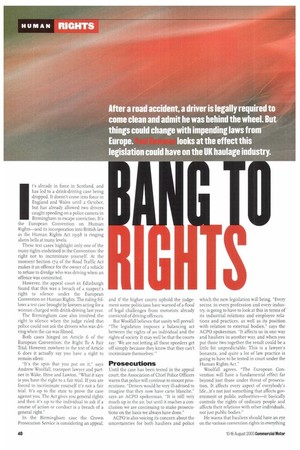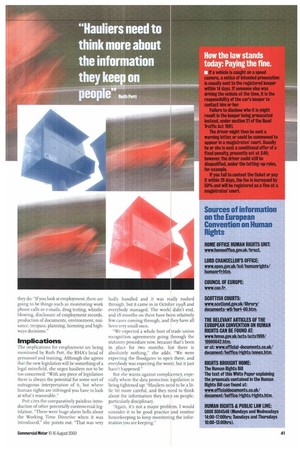After a road accident, a driver is legally required to
Page 42

Page 43

If you've noticed an error in this article please click here to report it so we can fix it.
come clean and admit he was behind the wheel. But things could change with impending laws from Europe. looks at the effect this legislation could have on the UK haulage industry.
t's already in force in Scotland, and has led to a drink-driving case being dropped. It doesn't come into force in England and Wales until 2 October, but has already allowed two drivers caught speeding on a police camera in Birmingham to escape conviction. It's the European Convention on Human Rights—and its incorporation into British law as the Human Rights Act 1998 is ringing alarm bells at many levels.
These test cases highlight only one of the many rights enshrined in the Convention: the right not to incriminate yourself. At the moment Section 172 of the Road Traffic Act makes it an offence for the owner of a vehicle to refuse to divulge who was driving when an offence was committed.
However, the appeal court in Edinburgh found that this was a breach of a suspect's right to silence under the European Convention on Human Rights. The ruling follows a test case brought by lawyers acting for a woman charged with drink-driving last year.
The Birmingham case also involved the right to silence when the judge ruled that police could not ask the drivers who was driving when the car was filmed.
Both cases hinged on Article 6 of the European Convention: the Right To A Fair Trial. However, nowhere in the text of Article 6 does it actually say you have a right to remain silent.
"It's the spin that you put on it," says Andrew Woolfall, transport lawyer and partner in Wake, Dyne and Lawton. "What it says is you have the right to a fair trial. If you are forced to incriminate yourself it's not a fair trial. It's up to the state to prove the case against you. The Act gives you general rights and then it's up to the individual to ask if a course of action or conduct is a breach of a general right."
In the Birmingham case the Crown Prosecution Service is considering an appeal, and if the higher courts uphold the judgement some politicians have warned of a flood of legal challenges from motorists already convicted of driving offences.
But Woolfall believes that sanity will prevail: "The legislation imposes a balancing act between the rights of an individual and the rights of society. It may well be that the courts say: 'We are not letting all these speeders get off simply because they know that they can't incriminate themselves.'"
Prosecutions
Until the case has been tested in the appeal court, the Association of Chief Police Officers warns that police will continue to mount prosecutions. "Drivers would be very ill-advised to imagine that they now have carte blanche," says an ACRID spokesman. "It is still very much up in the air, but until it reaches a conclusion we are continuing to make prosecutions on the basis we always have done."
ACP° is also voicing its concern about the uncertainties for both hauliers and police which the new legislation will bring. "Every sector, in every profession and every industry, is going to have to look at this in terms of its industrial relations and employee relations and practices, as well as its position with relation to external bodies," says the ACPO spokesman. "It affects us in one way and hauliers in another way, and when you put those two together the result could be a little bit unpredictable. This is a lawyer's bonanza, and quite a lot of law practice is going to have to be tested in court under the Human Rights Act."
Woolfall agrees. "The European Convention will have a fundamental effect far beyond just those under threat of prosecution. It affects every aspect of everybody's life. it's not just something that affects government or public authorities—it basically controls the rights of ordinary people and affects their relations with other individuals, not just public bodies."
He warns that hauliers should have an eye on the various convention rights in everything they do: "If you look at employment, there are going to be things such as monitoring work phone calls or e-mails, drug testing, whistleblowing, disclosure of employment records, production of documents, environment, nuisance, trespass, planning, licensing and highways decisions."
Implications
The implications for employment are being monitored by Ruth Poll, the RHA's head of personnel and training. Although she agrees that the new legislation will be something of a legal minefield, she urges hauliers not to be too concerned: "With any piece of legislation there is always the potential for some sort of outrageous interpretation of it, but where human rights are infringed you have to look at what's reasonable."
Poll cites the comparatively painless introduction of other potentially controversial legislation. "There were huge alarm bells about the Working Time Directive when it was introduced," she points out. "That was very badly handled and it was really rushed through, but it came in in October 19 98 and everybody managed. The world didn't end, and 18 months on there have been relatively few cases coming through, and they have all been very small ones.
"We expected a whole host of trade union recognition agreements going through the statutory procedure now, because that's been in place for two months, but there is absolutely nothing," she adds. "We were expecting the floodgates to open there, and everybody was expecting the worst, but it just hasn't happened."
But she warns against complacency, especially where the data protection legislation is being tightened up: "Hauliers need to be a little bit more careful, and they need to think about the information they keep on people, particularly disciplinary.
"Again, it's not a major problem. I would consider it to be good practice and routine housekeeping to keep monitoring the information you are keeping."








































































































